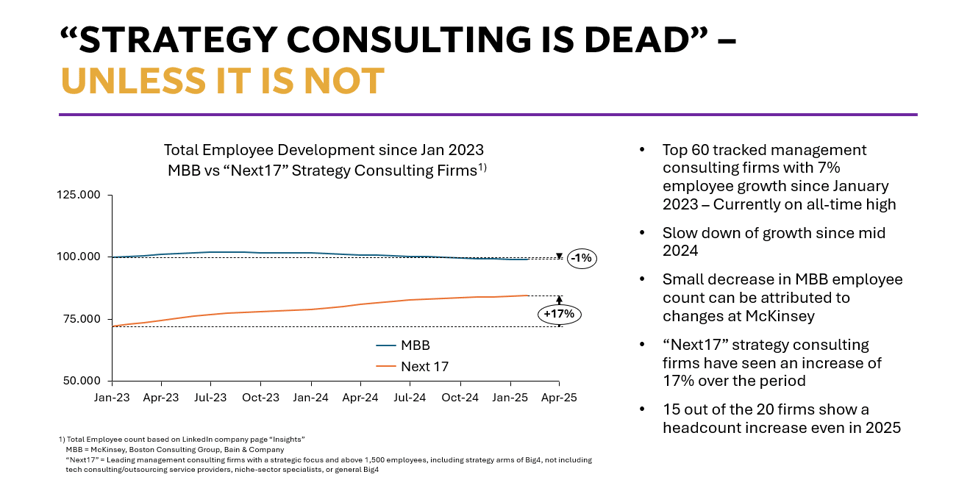Strategy Consulting: Reports of Its Death Have Been Greatly Exaggerated 📈
For years—perhaps even decades—many have speculated about the decline of management consulting. With each new technological wave, industry shifts, or economic downturns, voices predicting the demise of strategy consulting have grown louder. The recent rise of artificial intelligence (AI) has only amplified this narrative, with claims that AI-driven insights and automation could make high-level consulting obsolete. However, the data tells a different story—a more nuanced and promising one.
Daniel Cremer
2/10/20252 min read
Consulting is Thriving, Not Declining
I have been tracking the headcount development of 60 major consulting firms on a monthly basis, and the latest numbers reveal a resilient and evolving industry. Here are some key insights from the latest trends:
✅ 7% growth across the top 60 firms since January 2023, reaching an all-time high.
📉 A slowdown in growth since mid-2024—but importantly, not a reversal.
⚠️ A slight dip in MBB headcount, primarily driven by changes at McKinsey.
✅ “Next20” strategy consulting firms (leading firms outside of MBB with a strategic focus) grew by an impressive 18% in the same period.
✅ Looking ahead to 2025, 17 out of the top 20 firms are still expanding.
Why Strategy Consulting Continues to Grow
Despite the widespread adoption of AI and digital tools, companies still require strategic advisors to navigate uncertainty and develop long-term competitive advantages. The complexity of global markets, regulatory changes, and emerging business models necessitate human expertise that AI alone cannot provide.
Moreover, strategy consulting firms have embraced technology rather than resisted it. Many firms now leverage AI-powered analytics, digital transformation strategies, and automation tools to enhance decision-making and provide deeper insights. This hybrid approach, combining human ingenuity with technological advancements, has allowed the consulting industry to remain highly relevant.
Additionally, there has been a growing demand for specialized consulting services. Clients seek tailored solutions in industries such as healthcare, fintech, sustainability, and digital transformation. As new challenges emerge, consulting firms that adapt and innovate are securing long-term success.
What This Means for the Industry
The data suggests that while the market is evolving, consulting is far from being in decline. Instead, it is undergoing a shift, with strong growth among firms beyond the traditional MBB (McKinsey, BCG, and Bain). These “Next20” firms, which include strategy arms of Big 4 firms and other high-performing consultancies, are expanding at a rapid pace.
This trend highlights two major takeaways:
Strategy consulting remains in demand. Companies continue to seek expertise in navigating complex business challenges, even in an AI-driven world.
The consulting landscape is diversifying. Growth outside of MBB indicates that clients are exploring a broader range of firms to meet their strategic needs.
Technology is a tool, not a threat. AI and automation are enhancing consulting rather than replacing it, allowing firms to provide even greater value to their clients.
The Future of Strategy Consulting
As we move into 2025, consulting remains a strong and dynamic industry. While AI and automation will undoubtedly influence consulting work, they are unlikely to replace the high-level strategic thinking, problem-solving, and client relationships that define the field. The key to success will be adaptability—firms that embrace new technologies, expand into emerging markets, and develop specialized expertise will thrive in the years ahead.
I will continue tracking these headcount trends and providing updates on how the consulting industry evolves. Stay tuned for more insights!
#StrategyConsulting #ConsultingTrends #AIandConsulting #ManagementConsulting #FutureOfWork #Next20 #MBB #DigitalTransformation #BusinessGrowth #ConsultingInnovation
Connect
Partnering with you for exceptional leadership solutions.
contact@a-game-search.com
© 2024. All rights reserved.

